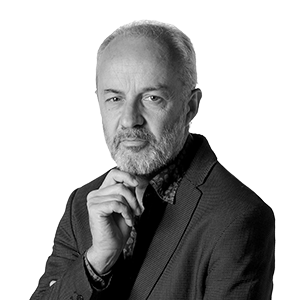

Forgiveness, compassion, respect for others, work ethic, humility, love... These are values that, whether we like it or not, have permeated us for centuries. And that, despite the death of God and the triumph of depersonalized AI, refuse to disappear. Nostalgia for faith? No. Perhaps nostalgia for the good life. President Salvador Illa, like a leftist hill, shamelessly proclaims these values. President Donald Trump, in practice, loudly denies them every day. By action or omission, both remind us of this undercurrent of Western history that draws on the classical Greco-Roman world and the redeeming figure of Jesus. Christian humanism: the person, with their contradictions and weaknesses, at the center.
Postmodernism relativized these values, shattered certainties: above all, the idea of progress. It left people freer but exposed to the elements. In bewildering and hopeless times like the present, consciously or not, we search for some security to hold on to, some simple and essential truth. Faced with the helplessness of a world adrift, many people turn inward, soaking inward: through yoga, art, literature, reconnecting with nature... The flight forward through material consumption only produces an addictive dissatisfaction.
Ideologies and politics have collapsed. Democracy is once again on the line. Ultra-populist noise has taken over public debate, like a kind of apocalyptic millenarianism, like a sectarian and anti-revolutionary religion. This is what Trump represents, the antithesis of Christian humanism. If any relevant figure serves as his counterpart, it is Pope Francis. The fact that the pontiff is fading only accentuates the contrast: the vitality of evil versus the fragility of good. Bad times for goodness. Trump's appeal is precisely that of the demonic abyss, of total transgression, the power of someone with the idea of setting it in motion, of breaking the toy. The world doesn't work, right? Well, we're starting from scratch. This is the nihilistic rhetoric and gestures that make him triumph.
"We are the worst sellers of the best product," says Sister Lucia Caram of the Church in relation to the Christian message. One day Caram told the Pope: "In the Catholic Church it is very difficult to be a Christian," and the pontiff replied: "Is it difficult to be a Christian?""Are you calling me or are you telling me?" With Trump, it's the other way around: he's the best salesman of the worst product. Which product? The strong have the right to devour the weak, the poor are poor because they've asked for it, cooperation is a trap, compassion is stupid. He plays on aporophobia, the fear of the poor, of immigrants. He plays on the mirage of wealth. His is a world of schematic good and evil. Not of singular, estimable individuals. As the Christian humanist Machiavelli said of rulers, Trump wants to be both feared and loved, and if he must choose, more feared than loved. But he's far from resembling the Prince, the astute and cultured Caesar Borgia. Of course, like him, he likes to wage war. For the moment, it's a commercial war.
Pascal, another Christian humanist, said: "Man is neither angel nor beast, and whoever wants to play the angel plays the beast." Trump doesn't hide it. He directly wants to play the beast. He is transparent in his hunger for power and glory. It's as if he were playing at changing the destiny of the world, like a madman. Erasmus of Rotterdam, father of humanism and illegitimate son of a Catholic priest, in his satirical In Praise of Folly He already warned that individuals are often driven by the futile desire for fame and that Follia, the antithesis of reason, is responsible for causing wars. No, the greedy Trump isn't reasonable. Nor does he pretend to be. Does he have any sense of right and wrong? Actor Robert De Niro believes not, that he's worse than a villain; he believes he's an amoral being. I'd say he's right. Trump is clear and striking proof of the need to breathe new life into Christian humanism, a good classic product for the global trade of ideas.
